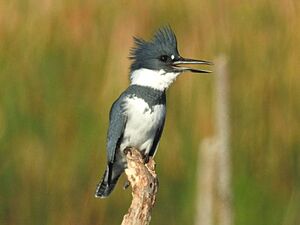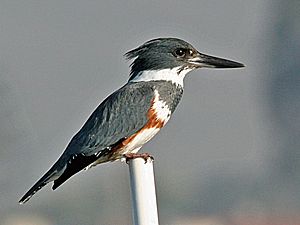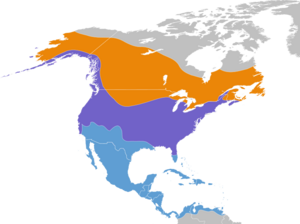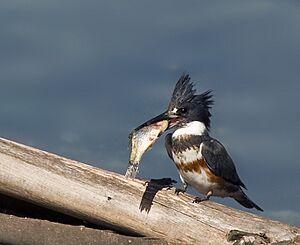Belted kingfisher facts for kids
Quick facts for kids Belted kingfisher |
|
|---|---|
 |
|
| Adult male | |
 |
|
| Adult female |
|
| Conservation status | |
| Scientific classification |
|
| Kingdom: | Animalia |
| Phylum: | Chordata |
| Class: | Aves |
| Order: | Coraciiformes |
| Family: | Alcedinidae |
| Subfamily: | Cerylinae |
| Genus: | Megaceryle |
| Species: |
M. alcyon
|
| Binomial name | |
| Megaceryle alcyon (Linnaeus, 1758)
|
|
 |
|
| Approximate distribution map
Breeding Year-round Nonbreeding |
|
| Script error: The function "autoWithCaption" does not exist. | |
| Synonyms | |
|
|
Script error: No such module "Check for conflicting parameters".
The belted kingfisher (Megaceryle alcyon) is a cool bird found in North America. It's a type of kingfisher that loves water. These birds are known for their unique look and how they hunt for fish.
Contents
About the Belted Kingfisher's Name
Scientists give every animal a special two-part name. This helps everyone know exactly which animal they are talking about. The belted kingfisher's scientific name is Megaceryle alcyon.
A Swedish scientist named Carl Linnaeus first described this bird in 1758. He gave it the name Alcedo alcyon. Later, a German scientist, Johann Jakob Kaup, gave it the genus name Megaceryle in 1848.
The word Megaceryle comes from an ancient Greek word meaning "great." The word alcyon is Latin for "kingfisher." So, its name basically means "great kingfisher"!
What Does a Belted Kingfisher Look Like?
The belted kingfisher is a medium-sized bird, about the size of a small crow. It measures about 28 to 35 centimeters (11 to 14 inches) long. Its wingspan can be between 48 and 58 centimeters (19 to 23 inches).
These birds have a big head with a shaggy, messy-looking crest of feathers. They also have a long, strong, black bill with a gray bottom part.
Both male and female kingfishers have a blue-gray head, a big white collar, and a wide blue band across their chest. Their backs and wings are blue-gray with small white dots.
What's really interesting is that the female kingfisher is more colorful than the male! She has an extra reddish-brown band across her belly. Young kingfishers look similar to adults, but their reddish-brown band might be a bit spotty.
Where Do Belted Kingfishers Live?
Belted kingfishers live near water, like rivers, lakes, and coasts. You can find them across most of North America, including Canada, Alaska, and the United States.
When winter comes and the water freezes in the northern areas, these birds fly south. They travel to the southern United States, Mexico, and Central America. Some even go as far as the West Indies.
They are sometimes seen far from their usual homes, even on islands in the Pacific Ocean. This happens when they accidentally fly off course during their long migrations.
How Do Belted Kingfishers Live?
Belted kingfishers are expert fishers! You'll often see them sitting quietly on a branch or post near the water. They wait patiently, then suddenly dive headfirst into the water to catch fish.
Besides fish, they also eat other small water creatures. This includes frogs, snails, crabs, and insects. Sometimes, they might even catch small mammals, birds, or reptiles. They have also been known to eat berries!
When a kingfisher flies, it often makes a loud, rattling call. It sounds a bit like a noisy rattle! Because of this, a group of belted kingfishers is sometimes called a "rattle."
These birds build their nests in tunnels. They dig these tunnels into riverbanks or sandbanks. Both the male and female work together to dig the tunnel.
The female lays about five to eight eggs. Both parents take turns sitting on the eggs to keep them warm. They also both help feed the baby birds once they hatch.
The nest tunnel often slopes uphill. One reason for this might be to protect the baby birds if the river floods. The uphill slope could create an air pocket, keeping the chicks safe.
Images for kids
 | James B. Knighten |
 | Azellia White |
 | Willa Brown |







